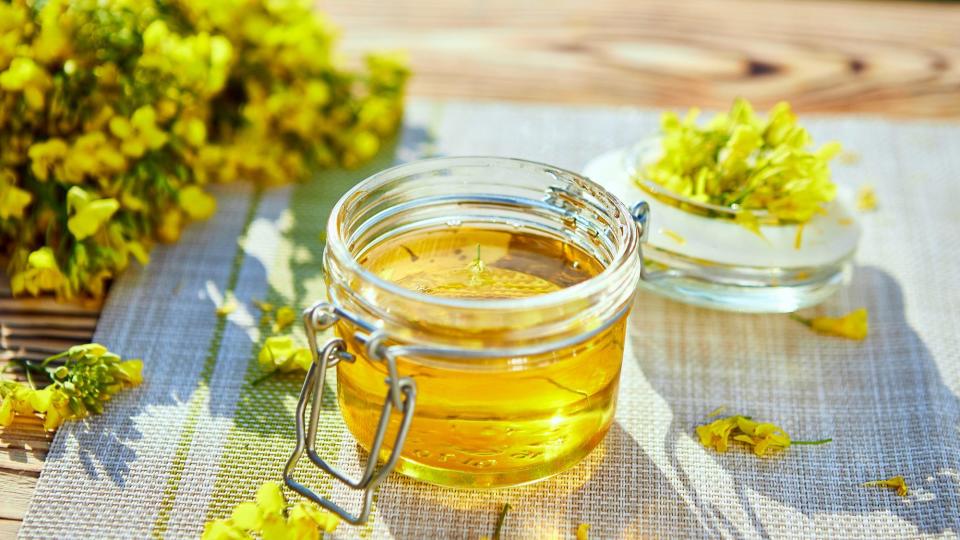Rapeseed Oil Is a Valuable Source of Healthy Fats—Here's What to Know Before Cooking With It
Rapeseed oil is extracted from the seeds of the rape plant, a flowering plant that belongs to the Brassica family that includes produce favorites such as broccoli, cauliflower, and cabbage.
"Traditional rapeseed oil, once grown primarily for industrial purposes with levels of erucic acid greater than 45 percent, was eventually bred to an edible oil with less than 2 percent erucic acid. Canadians and Americans called this new oil canola oil," explains Laura Cipullo, RD, founder of Laura Cipullo Whole Nutrition and Yoga.

Getty Images
According to Cipullo, rapeseed oil is considered a close second to olive oil by many, especially when it comes to its benefits related to heart health. "In a study investigating nonalcoholic fatty liver, both canola and olive oils decreased triglycerides, fasting blood glucose, and reduced the significance of the fatty liver," she says.
Read on to discover more health benefits of rapeseed oil, including how to choose the best oil based on your dietary and cooking needs.
RELATED: The Top 7 Healthiest Cooking Oils
Rapeseed Oil Benefits
It promotes heart health with omega-3 fatty acids.
"Cold-pressed rapeseed oils and even cold-pressed canola oils are a valuable source of the omega-3 essential fatty acid linolenic acid (ALA), which can be converted to the heart- and brain-friendly fatty acids eicosapentaenoic acid (EPA) and docosahexaenoic acid (DHA)," says Cipullo. "While most Americans get less than the 50 percent needed recommended dietary allowance of ALA, it is of utmost importance for women of child-bearing years to increase their consumption specifically through rapeseed oil and walnuts."
It can help with cognitive development.
Cipullo notes that including omega-3 fatty acids in your diet increases the concentration in both blood, adipose tissue, and breast milk. "In addition to preventing cardiovascular disease in women of all ages, benefits of consumption include cerebral and cognitive development in infants," she says.
It has omega-6 fatty acids for healthy growth and development.
Rapeseed oil also contains omega-6 fatty acids, which aid in brain function and development, as well as skin, hair, and bone growth. It can also help maintain the reproductive system and regulate metabolism.
It contains key vitamins.
Rapeseed oil also provides a boost of vitamin E, an antioxidant linked to improved eye health and the prevention of diseases such as Alzheimer's, along with vitamin K, which promotes bone density and helps maintain healthy blood clotting.
RELATED: These Are the Healthiest—and Least Healthy—Types of Fat to Eat

